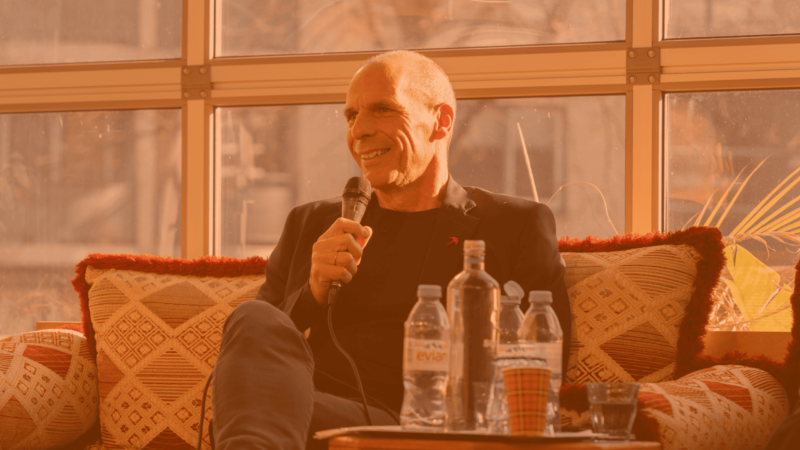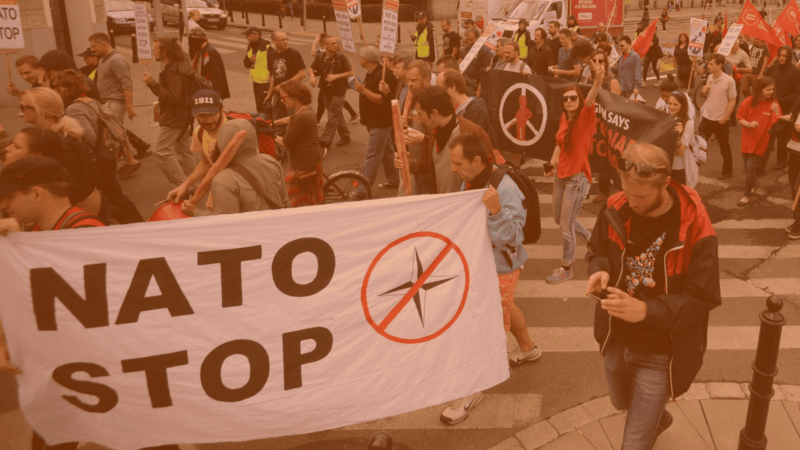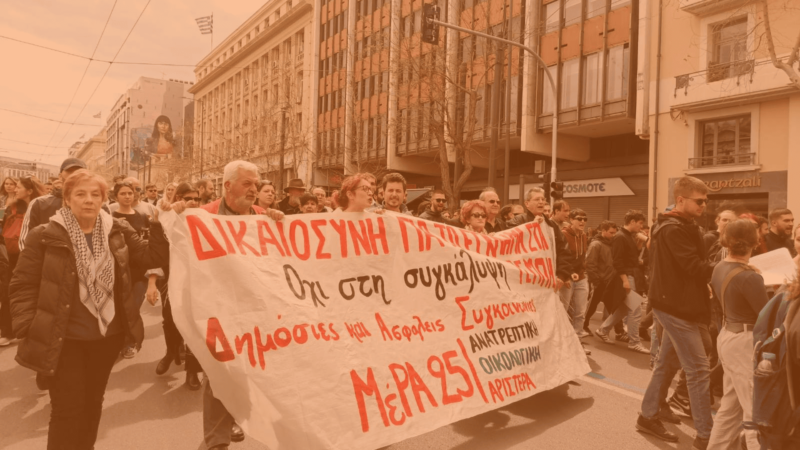We must pay attention to what words are used amidst a dangerous normalisation of propaganda and alternative facts
Words are counterposed to action, seen as confined to the realm of debate, and the terrain of philosophers and speaking events. The phrase ‘only words’ is generally used to criticise and dismiss (‘talk is cheap’; ‘all talk and no action’). But as the word ‘propaganda’ attests, the power of words as incentive to action — and in this way even a form of action — is also well known.
Language serves diverse purposes. This is why it is challenging to stay alert to its multiple uses in the digital age, in increasingly unequal societies in which privilege is rationalised and deflected by corporate PR speak, and amid the normalisation of ‘alternative facts’.
Revisiting the language of ‘choice’
The co-option of choice through the use of a language of choice (‘just do it!’; ‘because you’re worth it!’) is now a well-honed strategy. It is so constantly deployed by corporate interests in western so-called democratic societies, it has become as common as the air we breathe. This also means that its function of deflecting attention from the structural constraints which impede the exercise of viable choice can remain hard to recognise (even as survival is increasingly at stake for vast sections of whole populations).
The language of individualism that underpins the western political tradition continues to be a gift to rapacious oligarchical interests. In the current gilded age of neoliberalism, it has been contorted and exploited beyond the intentions and wildest imaginings of Adam Smith and Enlightenment thinkers of the eighteenth century: “Were Voltaire to reappear today, he would be outraged by the new structures, which (…) deformed the changes for which he struggled.”
As the margin for economic choice widens exponentially for minority interests, it is not so much eroded, as dissolved completely for countless of the world’s population who can only ‘choose’ subsistence. This is within as well as outside ostensibly advanced or developed societies. The co-option of language in perpetrating these grotesque disparities needs more attention.
The co-option of terms undermines climate and environmental policy
It is not only human life which is at stake in the co-option of language by the marketing of multi-million dollar interests and industries. Just as companies which flag support for the Black Lives Matter movement on their websites continue to deny basic wages and safe employment conditions to the workforce on which they rely, so the EU is now using the language of the ‘green new deal’ — a co-option described as ‘greenwashing’ — to deflect attention from the continuation business as usual.
The world literally burns as governments, organisations and institutions — as much as the marketing campaigns of corporations — spin the linguistics of their PR heists.
The familiarity of language and labels which are co-opted (whereby the contrasting interests they serve are concealed) is insidious. This is especially true when the initial and original progressive connotations of terms are literally capitalised on to further interests which are diametrically opposed.
Seemingly neutral language — in contrast to that which is openly ideological — is difficult to recognise as problematic. The weaponisation of words can be so covert as to be barely detectable. They often serve as a cover through the use of certain terms that can continue to reassure even as they advance oligarchical agendas and we are being encouraged to look away.
The weaponisation of words in neoliberal style
The deceptively simple sophistication of well-funded marketing campaigns is not new. Nor is economic inequality (which “everybody knows” as Leonard Cohen intones in a now classic track). But precisely because it is a cliché, `the rich get richer’ can contribute to resignation rather than to the concerted measures required in response. It also deflects attention from the policies and processes which allow now unprecedented socioeconomic disparities to escalate.
The weaponisation of language — and the activating or pacifying potential of single words — is pivotal to the mechanisms and means by which sectional interests are furthered at the expense of the public they purport to serve.
Thus words become weaponised in ways we need to recognise in order to intercept. The globalised and digital age also presents additional challenges to those prefigured by Lewis Carroll: “When I use a word,” Humpty Dumpty said in rather a scornful tone, “it means just what I choose it to mean — neither more nor less.”
Marshall McLuhan’s dictum that ‘the medium is the message’ has new implications in today’s increasingly polarised mediascape where the capacity of corporate and sectional interests to monopolise platforms of communication has increased. Through the Looking Glass is now refracted through multiple angles:
“The question is,” said Alice, “whether you can make words mean so many different things.”
“The question is,” said Humpty Dumpty, “which is to be master — that’s all.”
In the current period of austerity for the many and socialism for the few, the language of ‘winners and losers’ — determined by ostensibly ‘free’ and ‘democratic’ societies — has displaced the language of masters and slaves. But it has not replaced the inequality which proliferates at truly staggering levels, and which is upheld to a significant degree by the words used to describe — i.e. disguise — it.
New words, old words, and the language of power
New words, and new applications of words, which describe but also obfuscate the exercise of power (such as ‘rendition’) are entering public discourse. ‘Collateral damage’ — where ‘damage’ means injury or death to civilians and ‘collateral’ equates to human beings — is a term which is now familiar. Notably, as in the case of `rendition’, the term is sanitised, leached of emotional impact, and thereby deflects attention from the enormity of what it entails.
Familiar words like ‘controversy’ and ‘conspiracy’ can also be put to different uses and applied in nefarious ways. For example, what is no longer supported by evidence can be implied to be controversial for the purpose of upholding corporate interests. An early example is the harmful effects of smoking when it became impossible to deny the link to lung cancer. Rather than ceding to the evidence, tobacco companies implied the link to be dubious by labelling it ‘controversial’ This is a strategy and phenomenon that is now rampant. The term agnotology was coined by Stanford University professor Robert Proctor to describe exactly such attempts to sow public confusion and doubt.
The use of the word ‘conspiracy’, as an accusation rather than simple description, is also complex and high-stakes. At one level it describes bizarre theories and beliefs for which there is no foundation. But it can also be used as a silencing strategy to deflect attention from activity which may seem to lack credibility but which does and continues to occur. As Marshall McLuhan underlined, “Only puny secrets need protection. Big discoveries are protected by public incredulity.” An important distinction needs to be made between movements and claims which are fabricated and use of the word ‘conspiracy’ to silence legitimate attempts to draw attention to abuses of power.
More words to watch out for
There are many words and phrases we should not let go to the keeper. Chomsky warned years ago that actions taken in `the national interest’ should attract close scrutiny. Similarly, current policies in the name of `public health’ with respect to the coronavirus should not be taken at face value.
Words like ‘sovereignty’ and ‘terrorism’ should be carefully examined (the former because it is so often invoked to deflect from human rights violations and the latter because it is so selectively applied). We need to remember that there is a such a thing as state terrorism, which is exemplified today by the government-sponsored attacks on peaceful protestors we are witnessing in cities around the world.
Yet the term ‘terrorism’ is routinely individualised. In western societies the term is also routinely applied to ‘Muslim fundamentalists’ rather than to white supremacists (who are often home-grown and who are described in a current podcast by American documentary filmmaker Michael Moore as ‘the terrorists next door’).
The individualist bias of western societies — which is reflected in language that deflects from structural factors and context and which is the legacy of the western tradition itself — also defines what violence in the west is considered to be. That is, the actions of a lone individual actor/s — eg. the man with the gun — rather than the product of structural, systemic and also linguistic practices which embed and perpetuate social, political and economic inequality on a large scale. The distinction between ‘human’ and ‘humane’ (terms which are often conflated and used interchangeably) also needs to be maintained.
The words we use matter because they structure the way we think
In his best-selling treatise On Tyranny, Timothy Snyder notes “the narrowing of vocabularies, and the associated difficulties of thought.” The importance of critical thinking at this time — of thinking through cliches and slogans that discourage the attention they should attract — cannot be overstated.
Reflecting on the horrors of Nazism, Hannah Arendt noted the lack of mental and conceptual preparation for discussion of moral issues on the part of those who might have been expected to provide it: “We had to learn everything from scratch, in the raw, as it were — that is, without the help of categories and general rules under which to subsume our experiences.”
Intellectuals and politicians of the thirties were no better equipped than the general population to address the urgent challenges of their time. We cannot look to authorities to provide the guidance or answers for which we need to develop and hone our own critical faculties; despite all that would discourage this. This is especially when so many authorities are themselves implicated in, if not active perpetrators of, the very policies and actions which need to be criticised.
In fighting the oligarchies of today we are in good company
In the face of the current travesties of justice (of which the extradition hearing of Wikileaks founder Julian Assange is key) the rewording of the term to `just us’ is striking and apposite. Robust responses are called for; and as Yanis Varoufakis points out, we need to become as organised as the oligarchical right in opposing the considerable interests ranged against us. As Ece Temelkuran notes in How to Lose a Country, “we have to come to terms with the fact that there can be no understanding without action (namely political action).”
Final word to Canadian philosopher and public intellectual John Ralston Saul, who was unequivocal nearly two decades ago that Voltaire would be `outraged’ by what has subsequently occurred in his name. These are occurrences we may well see as reaching horrific culmination in the current period: “As for his descendants — our ruling elites — he would deny all legal responsibility and set about fighting them, as he once fought the courtiers and priests of 18th century Europe.”
Photo Source: Photo by Digital Buggu from Pexels.
The views and opinions expressed here are those of the author and do not necessarily reflect DiEM25’s official policies or positions.
Do you want to be informed of DiEM25's actions? Sign up here















